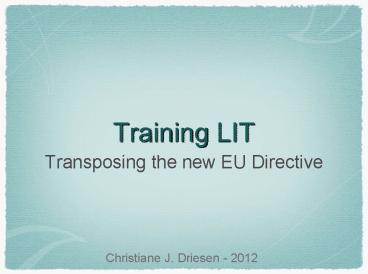Training LIT - PowerPoint PPT Presentation
1 / 29
Title:
Training LIT
Description:
Qualified interpreters in command of all interpreting techniques sight translating and interpreting consecutive simultaneous ... – PowerPoint PPT presentation
Number of Views:129
Avg rating:3.0/5.0
Title: Training LIT
1
Training LIT
- Transposing the new EU Directive
Christiane J. Driesen - 2012
2
Aiming at Best Training Practicesto comply with
the Directive
3
Relevant Articles 2 (8), 3 (9), 5 (1),(2),(3)
4
Police setting
5
Thus a fair trial derived from the Directive
requires...
- Qualified interpreters in command of all
interpreting techniques - sight translating and interpreting
- consecutive
- simultaneous (Whispering)
- socio-cultural awareness
- legal and judicial knowledge
- and in particular professional ETHICS
- Equivalent to international Jurisdictions
6
Holly MikkelsonInterpreting is Interpreting
Thus Why should there be any difference of
quality between international and national
proceedings? Remember Nuremberg!
7
For Illustration
8
Prosecutor reading
9
Sight Interpreting
10
Judge interviewing...
11
Consecutive
12
Whispering and Consecutive
13
Interpreting a Witness Whispering Consecutive
14
Bidule
15
Sign Language
16
(No Transcript)
17
Main Training Challenges
18
Languages of lesser diffusion
- Immigration language requirements vary constantly
and at short notice - Trainers for interpreting and translating in
languages of lesser diffusion are scarce - Many languages of lesser diffusion do not exist
in written form
19
Languages over 5 Years
- Albanisch (1) Georgisch (1) Ungarisch (2)
- Arabisch (5) Italienisch (8)
Rumänisch (2) - Aserbaidsh. (1) Japanisch (1)
Russisch (16) - Bulgarisch (1) Koreanisch (1)
Serbo-Kroatisch (5) - Chinesisch (4) Lettisch (1)
Spanisch (13) - Dänisch (1) Persisch (5) Thai (1)
- DGS (5) Polnisch (16) Tschechisch (1)
- Englisch (17) Portugiesisch (5) Türkisch
(9) - Französisch (4)
Vietnamesisch (1)
20
Challenges for traditional structures
- Traditional universities have great difficulty
adapting to these challenges - Their training being often still more focused on
language than on technique - They cannot yet adapt their recruitment to
constantly changing market needs
21
Solution tandem method within two qualification
formats
- Within a regular university curriculum (B.A. or
Master Degree). Authorities participating in
final exams gt access to central register - Further training (120 hrs with trainers/300 hrs
at home) ending with certification. Authorities
participating in final exams gt access to central
register - Authorities indicating their linguistic needs
22
Didactic principles
- Training interpreting techniques in the local
language (lingua franca) for multilingual groups - Interpreting trainer working in tandem with a
highly qualified linguist checking accuracy of
rendering and giving speech presentations
(participating in dialogues) in the rare
language - Participation of professionals (lawyers, doctors,
police, etc.)
23
Curriculum
- 2 basic semesters
- improvement of language skills
- introduction to translating and interpreting
- law, economics
- intercultural communication
- informatics I
- 2 semesters at a partner university
6
24
3 semesters of intensive training
- terminology I and II
- science of translating and interpreting
- law (II , III and IV), economics II
- intercultural communication
- consecutive and simultaneous interpreting
- specialised and sight translating
- professional ethics
- legal translating
- informatics II
- B.A. thesis
7
25
Example II - CPD
- (Hamburg, Magdeburg) - similar in Zurich
- admission requirements university degree,
interview and/or test - 1 year, 120 hours
- 50 hours on law, public services, etc.
- 70 hours interpreting and translating (including
terminology) - 300 hours personal training/homework (CREDITS)
26
Final written examination
- Legal translation - 5 hours, both directions
- certificates (Registry)
- documents relating to civil and criminal
proceedings
27
Final oral examination
- questions on judicial proceedings (judge) 15
minutes - sight translation - 25 lines (both directions)
- consecutive interpreting (with notes) 5 minutes
(both directions) - simultaneous (with whispering equipment -
bidule) 8 minutes (both directions)
28
Perspectives
- A good Solution for transposing the Directive
- training recognised by authorities and courts
sworn interpreters - flexibility for training rare languages according
to the needs of authorities
10
29
Dank U Wel!































